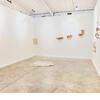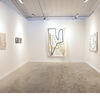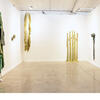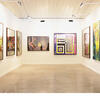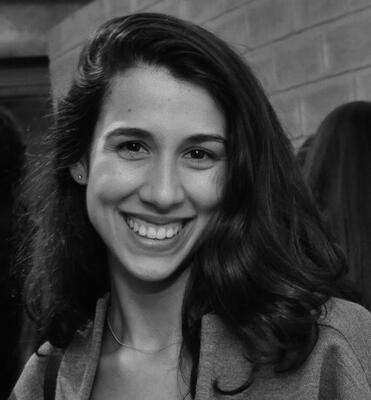Curator Isabella Lenzi
Earth’s Navel
brings together artists who work from an intimate relationship with organic and textile matter, the land, and the knowledge passed down from generation to generation. The proposal is rooted in the idea of the earth as a living body, an archive, and a source of knowledge: a place where the spiritual, the political, and the poetic converge. The “navel” evokes a point of origin—a connection between body and land, a site of nourishment and vital transmission—an image that can also be applied to threads, weavings, and manual gestures. Textile practice, understood as a symbolic extension of the earth, shares with it the condition of being a living fabric, a bearer of memory and relation. From this shared image, the section seeks to open a space for dialogue between practices that overflow the boundaries of contemporary art, reclaiming ways of making and forms of knowledge that were long silenced, marginalized, or undervalued.
The works gathered here challenge the divisions between art and craft, between creation and care, between knowledge and making. From different geographies and genealogies, the invited artists place ancestral and traditional knowledge at the center, asserting its symbolic, intellectual, and critical force. In all of them, the body, the landscape, and matter—textile, organic, pictorial, or ceramic—appear as places of memory and resistance: territories where gestures, rhythms, and collective learnings are woven together, preserved primarily by women.
Within this framework, the participating artists propose distinct yet deeply resonant approaches. Sandra Monterroso, drawing from her Maya Q’eqchi’ heritage, works with organic materials, rituals, and actions that reactivate the memory of Indigenous peoples and their spiritual and political relationship with the land. Sonia Navarro explores textile languages and sewing and embroidery techniques as vehicles of cultural and affective knowledge, rereading craft traditions to expand the field of the political and the symbolic. Paloma de la Cruz, in turn, combines her research on traditional architecture and design with manual knowledge historically associated with the feminine, generating pieces that fuse ceramics and textiles into a dialogue between structure, ornament, body, and matter—transforming notions of the domestic, the spiritual, and the performative.
This constellation expands with Renan Teles and Uýra, who broaden the material field of the section through photography and painting—not as “media” separated from the earth, but as other ways of working with the living archive of what is seen, named, and silenced. Through their biographies and practices, they position the body—racialized, queer, strained by stigma or exoticization—as a territory of dispute and belonging. In Uýra, performance and photo-performance articulate scientific and ancestral knowledge to contemplate the contrast between forest and city, Indigenous diaspora, and the cycles of disappearance and resurgence of life. In Renan Teles, the intersection between photography and painting activates a critical investigation into the representation of Black and Afro-Indigenous bodies and their historical imaginaries, shifting identity from the realm of the fixed to that of the constructed. In both cases, the works bring to the section a register in which the landscape—natural and built—is also skin, and where the “archive” becomes embodied experience.
Through their works, these artists return to the hands—and the bodies—that transform earth, fiber, matter, and images their central role in constructing memory, knowledge, and the collective imagination capable of generating other possible futures.
Isabella Lenzi
Participaiting galleries
T20 - Murcia, Spain / Madrid, Spain
Artist: Sonia Navarro
Proyecto H - Mexico City, Mexico
Artist: Paloma de la Cruz
Fernando Pradilla - Madrid, Spain
Artist: Sandra Monterroso
Aura Galeria - São Paulo, Brazil
Artists: UÝRA and Renan Teles
Isabella Lenzi (1986, São Paulo, Brazil)
Lives in Madrid.
She is currently Visual Arts Curator at the Círculo de Bellas Artes in Madrid, as well as Artistic Director and Chief Curator of the Alberto Cruz Foundation in Santo Domingo, Dominican Republic. Until the end of 2023, she was a curator and researcher in the Collections Department of the Museo Nacional Centro de Arte Reina Sofía, where she took part in the project to reorganize the museum’s permanent collection. Previously, she worked as Curator of Visual Arts at Fundación Mapfre in Madrid.
In Brazil, she directed for seven years the cultural center of the Instituto Camões / Consulate General of Portugal in São Paulo, which she consolidated as a place for debate and experimentation, with a program of exhibitions, film cycles, public programs, and the publication of artist books and catalogues. The aim was to work in a situated way—mapping, supporting, and disseminating Portuguese cultural production by emerging and historical artists and thinkers—through a dialogue with the Brazilian and local context, adopting an approach that revisits the shared colonial past and present of both countries.
Since 2016, she has lived between Latin America and Europe. In Latin America, she was also part of the curatorial, public programs, and residency team at Videobrasil, a cultural association dedicated to mapping and disseminating art from the geopolitical South. She worked on the programming and coordination of two editions of the SESC_Videobrasil International Festival (now the SESC_Videobrasil Biennial). Previously, she worked in curatorial and exhibition coordination at Galeria Vermelho in São Paulo, and served as assistant curator of the 11th Cuenca Biennial in Ecuador.
In the United Kingdom, she worked in the curatorial department of the Whitechapel Gallery in London, where she coordinated the Neon Curatorial Exchange residency program between London and Athens, as well as exhibitions for the Exhibitions Archive Department. She has also collaborated on several European projects at institutions such as the Nouveau Musée National de Monaco and PAC – Padiglione d’Arte Contemporanea in Milan.
As an independent curator, she has curated projects at various Spanish institutions such as the Museo Reina Sofía, La Virreina Centre de la Imatge in Barcelona, the Círculo de Bellas Artes, La Casa Encendida, and the Sala de Arte Joven of the Community of Madrid, with a special focus on establishing spaces for dialogue and co-creation with the local fabric through transversal, collective, and collaborative proposals. She is currently preparing curatorial projects for the Centre del Carme de Cultura Contemporània in Valencia and MUCAC – Museo Centro de Arte Contemporáneo in Málaga.
She is an architect and urban planner trained at the Universidade de São Paulo and the Universidade do Porto (Portugal), with a specialization in Art History. She holds a Master’s in Photography and Visual Culture from Universitat Pompeu Fabra in Barcelona, a Master’s in Museum Studies from University College London (UCL), and an MRes in Museology from the Universidade de São Paulo.


